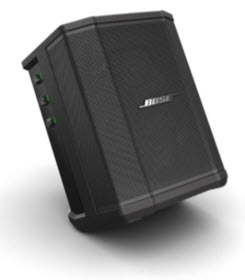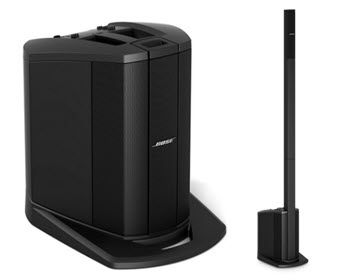From Bose Portable PA Encyclopedia
| Feature | Bose S1 Pro | Bose L1® Compact |
| |
 |
 |
| |
| Horizontal dispersion
|
120 degrees
|
180 degrees
|
| Vertical dispersion
|
50 degrees
|
40 degrees
|
| Output
|
103 dB / 109 dB peak
|
106 dB / 112 dB peak
|
| Speaker Array
|
Three 2.25" (5.715 mm) high-excursion drivers mounted in a curved Articulated Array®
|
Six 2.00" (51 mm) high-excursion drivers mounted in a curved Articulated Array® loudspeaker
|
| Woofer
|
One 6" (152 mm) low-frequency driver mounted behind the three driver in a curved Articulated Array®
|
One 8" (203 mm) low-frequency driver mounted in a ported bass enclosure in the power stand
|
| Frequency Response
|
|
- 65 Hz – 14 kHz +/- 3dB
- 50 Hz - 16 Hz (-10 dB)
|
| Power to speakers
|
Biamped 80 Watts RMS x 2, 160 Watts total
|
Biamped 65 Watts RMS x 2, 130 Watts total
|
| Weight
|
- 6.5 kg (14.3 lbs) – Without Battery
- 7.0 kg (15.5 lbs) – With Battery
|
Total system weight 13.4 kg (30.2 lb)
- Power Stand: 11.2 kg (24.6 lb)
- Extensions (each): 1.1 kg (2.3 lb)
|
| Multiple orientations
|
Elevated Surface
Position the S1 Pro on a surface. This projects sound clearly and evenly throughout the audience, and ensures that audience members enjoy the full frequency range of the system.
Tilt-Back
For performances where your audience is close to you, tilt the S1 Pro onto its back edge. For best results, the performer should stand or sit to one side of the loudspeaker to avoid blocking sound from the audience.
Monitor
To use the S1 Pro as a personal floor monitor, place it on the ground horizontally, in front of and pointing toward the performer. Tilt the loudspeaker onto its side edge.
Speaker Stand
Place one or two S1 Pro systems on speaker stands (sold separately) for general-purpose sound reinforcement.
Monitor
|
- Table Top (no extensions)
- Floor with both extensions
(no speaker stand required)
- Floor with one extension
|
| Bluetooth input
|
Yes: Channel 3
Supports Bluetooth 4.2
|
No
|
| Reverb
|
Yes
|
No
|
| ToneMatch® Presets
|
Channel 1
- Vocal Microphone
- Acoustic Guitar
- OFF (flat)
Channel 2
- Vocal Microphone
- Acoustic Guitar
- OFF (flat)
|
Channel 1
Channel 2
- Acoustic Guitar
- Line Level (flat)
|
| Battery
|
Yes internal (optional)
|
No
|
| Connections
|
Channel 1:
XLR / 6 mm (1/4" Tip-Ring or Tip-Ring-Sleeve) balanced / unbalanced
Channel 2:
XLR / 6 mm (1/4" Tip-Ring or Tip-Ring-Sleeve) balanced / unbalanced
Channel 3:
3 mm (1/8" Tip-Ring-Sleeve) accepts stereo or mono input
|
Channel 1:
XLR balanced
Channel 2:
- 6 mm (1/4" Tip-Ring or Tip-Ring-Sleeve) balanced / unbalanced
- 3 mm (1/8" Tip-Ring-Sleeve) accepts stereo or mono input
- Two RCA unbalanced phone plug
|
| Tone Controls
|
Channels 1 and 2
Channel 3
|
Channel 1
Channel 2
|
| Crossover Frequency
|
600 Hz
|
400 Hz 4th order Butterworth
|
| Line Out
|
¼ inch (6mm) jack: Nominal +4 dBu, Max +20 dBu
Note: Using a TS unbalanced cable will result in a drop in the audio level of -6dBu.
|
¼ inch (6mm) jack: Nominal +2.2 dBu, Max +20 dBu
Note: Using a TS unbalanced cable will result in a drop in the audio level of -6dBu.
|